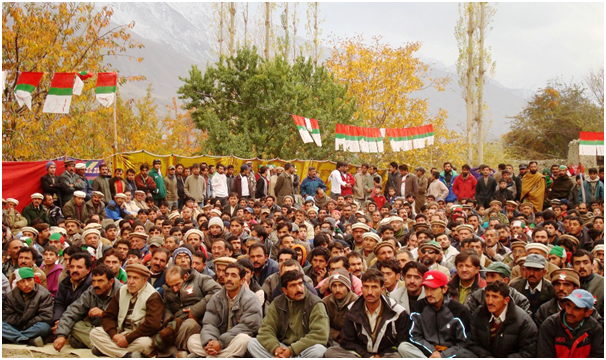New Flashpoint? Pakistan Responds to Chinese Pressure, Moves to 'Absorb' Gilgit-Baltistan
An election rally in Gilgit-Baltistan

NEW DELHI: India’s protests notwithstanding, Pakistan has now set up a committee for a possible amendment in its Constitution to give legal cover to Gilgit-Baltistan according to a detailed AFP report. This is being done reportedly at the behest of China that is poised to escalate investment in the region through a multi-billion-dollar infrastructure plan but is uncomfortable with the ‘non-legal’ status of the natural resource rich Gilgit and Baltistan that has not been “absorbed” into Pakistan legally.
Prime Minister Nawaz Sharif has brushed aside longstanding Indian concerns to set up a committee to look into the issue. An AFP report quoted Sajjadul Haq, spokesperson for the chief minister of Gilgit-Baltistan Hafiz Hafeez ur Rahman as saying, “A high level committee formed by the prime minister is working on the issue, you will hear good news soon.”
Gilgit Baltistan is currently not mentioned in the Pakistan Constitution as part of its official position staking claim to the entire region of Kashmir, that includes Azad Kashmir and Jammu and Kashmir through a referendum. Under the proposal, mooted and pushed by China, Pakistan is now looking to include Gilgit-Baltistan as part of Pakistan, and to send two lawmakers for the first time to the Pakistan National Assembly albeit with observer only status. AFP has quoted Pakistan government officials as saying that this proposal was being pushed by China for its $46 billion infrastructure plan to link China’s western city of Kashgar to the Pakistani port of Gwadar on the Arabian Sea. “China cannot afford to invest billions of dollars on a road that passes through a disputed territory claimed both by India and Pakistan,” AFP quoted the official, speaking on condition of anonymity, as saying.
Former Pakistan President Pervez Musharraf had tried to bring in a shift in Islamabad’s policy towards Gilgit-Baltistan by moving towards making it a ‘fifth province’.This did not come about of course, but in 2009 Pakistan did pass the Gilgit-Baltistan Empowerment and Self-Governance Order that granted self rule to the people of Gilgit-Baltistan through an elected Legislative Assembly and a local Council. It thus acquired a de facto province-like status without become a constitutional part of Pakistan.
India has already registered its strong objection to the Economic Corridor but clearly it has made little to no impact. Minister of External Affairs Sushma Swaraj has registered New Delhi’s objections to the corridor as it crosses territory that India considers her own. The government also raised strong objections to the elections held in Gilgit-Baltistan last year with the Ministry of External Affairs here maintaining, that this was an attempt by Islamabad “to camouflage its forcible and illegal occupation of the regions.”
The Pakistan announcement, if it indeed comes “soon”, will further add to the tensions between the two countries despite the peace visit by Prime Minister Narendra Modi to Lahore where he spent a couple of hours with PM Nawaz Sharif. More so as this PM Modi led bonhomie has already been jolted by the terror attack on the Pathankot Air Force base, and the almost simultaneous attack on India’s consulate in Afghanistan.
Both India and Pakistan have held on to their claims over the entire region, that includes the territory held by the other side respectively. Significantly, sources pointed out that by moving to give Gilgit-Baltistan a constitutional status, Pakistan could well be undermining what it claims to be the sanctity of the United Nations resolutions for a referendum in the entire region, that includes these ‘northern areas.’ And would give India a case to claim Jammu and Kashmir as its own integral part by pointing out that the Pakistan move, if indeed comes about, negates the UN resolutions that cover the full region--- described as Gilgit Baltistan, Azad Kashmir and Jammu and Kashmir--- and insist on a referendum.
In fact, Pakistan military analyst Ayesha Siddiqa has been quoted as such by the news agency as saying "If we begin to absorb it so can India. It legitimises their absorption of the Valley.” However, Ibrahim Sanai, the region's information minister, told AFP, "Gilgit-Baltistan will be made an independent provisional province till the final decision on Kashmir issue,” indicating that the decision will not affect Pakistan’s claim on Jammu and Kashmir.
Pakistan based its operations during the Kargil conflict in Gilgit-Baltistan with the Northern Light Infantry sustaining maximum losses. China has also shifted position by making it clear that it was willing to concede India’s claim on Arunachal Pradesh, or at least parts of it, in return for the Tawang tract. India has repeatedly raised objections to the presence of Chinese workers in the region. And MEA has under the Modi government as well re-asserted, “India’s position is well known. The entire state of Jammu and Kashmir, which includes the regions of Gilgit and Baltistan, is an integral part of India.”
New Delhi has been clear that the Self Governance Order by Pakistan was just “ continued efforts by Pakistan to deny the people of the region their political rights, and the efforts being made to absorb these territories. The fact that a federal minister of Pakistan is also the ‘Governor of Gilgit Baltistan’ speaks for itself.” This was a statement by MEA articulating the official position on what might become a constitutional province of Pakistan.



